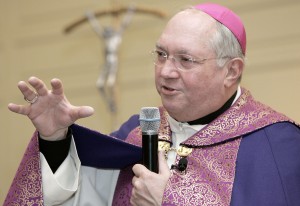Bishop Robert Morlino cracks down on Madison nuns for espousing 'New Ageism' and 'indifferentism'

11 hours ago •
Sisters Maureen McDonnell and Lynn Lisbeth, both Sinsinawa Dominicans, have diverged too far from Catholic teaching, according to a confidential memo sent Nov. 27 to priests on behalf of Morlino. A copy of the memo was leaked to the State Journal.
Two other women connected to the interfaith center, called Wisdom's Well, also have been banned as part of the same action.
The memo says Morlino has "grave concerns" about the women's teachings, specifically that they "espouse certain views" flowing from such movements as "New Ageism" and "indifferentism." The latter, according to the memo, is "the belief that no one religion or philosophy is superior to another."
The women "may not share an authentic view of the Catholic Church's approach to interreligious dialogue," the memo said.
Brent King, a spokesman for the diocese, said three other potential parish guest speakers, all male, have been banned "in recent years." The women are not prohibited from attending Mass or, if Catholic, from receiving communion, King said. Asked whether they could contribute to parish life in other ways, such as reading Bible passages from the pulpit or chairing a church committee, King said that would be up to individual priests.
The action comes amid a papal crackdown on nuns. Earlier this year, the Vatican accused the most influential group of Catholic sisters in the U.S. of "serious doctrinal issues" for not following Rome's lead on topics such as the male-only priesthood and homosexuality.
Interfaith approach
Wisdom's Well was founded in Madison in 2006. The center has no physical facility but offers workshops and retreats on topics such as nonviolence, contemplative living and Christian meditation.
The center's website says it "serves to support those who desire to grow spiritually, seek inner wisdom, and yearn for a transformative spirituality." Its mission statement says the center is "grounded in the Christian tradition, while embracing the wisdom found in other religious traditions."
Along with the sisters, the third staff member is Beth O'Brien, a married mother of two and a religious layperson affiliated with the Benedictine community. She also is banned, as is Paula Hirschboeck, a philosophy professor at Edgewood College in Madison who helped found Wisdom's Well but is no longer on its staff.
The women declined comment, referring questions to the Dominicans of Sinsinawa Congregation, based in southwestern Wisconsin.
'Valued members'
The order's spokeswoman, Tricia Buxton, released a statement saying McDonnell and Lisbeth are "respected and valued members" of the order, and that both women "have been dedicated to religious life and preaching and teaching Gospel values for nearly 50 years." The Sinsinawa Dominicans "wholeheartedly support our sisters and hold them in prayer as we continue our mission of participating in the building of a holy and just church and society," the statement said.
Buxton said Sinsinawa Dominicans have never before faced a prohibition like this in the diocese. The order has 521 sisters.
Both McDonnell and Lisbeth are well-known in Madison. McDonnell served for 21 years on the campus ministry staff at Edgewood College, her alma mater. Lisbeth regularly leads classes in spirituality at the Madison Senior Center.
At the time the memo went out, McDonnell was co-facilitating a series of weekly classes with 12 students at St. James Catholic Church in Madison titled, "Just Peace Initiative: The Challenge and Promise of Nonviolence for Our Time." The class has been moved, according to an organizer, who did not want the new site published.
Diocese's 'duty'
The memo sent to priests says the four women "are not to be invited or allowed to preach, catechize, lead spiritual or prayer instructions or exercises, or to provide spiritual direction or guidance at churches, oratories or chapels within the Diocese of Madison." No publicity materials from Wisdom's Well are to be allowed inside parishes.
The memo does not give specific examples of things the women may have said that violate church teaching. Rather, the memo references problematic statements on the center's website, including that the sisters embrace "the wisdom found in other religious traditions."
King said it is both the diocese's duty and right to ensure parish speakers transmit true church teaching. "A proposed speaker's association with a group whose philosophy is inconsistent with the Catholic faith disqualifies a proposed speaker," he said.
The prohibition against the sisters came only after the diocese "patiently and prudently" investigated the matter, King said. The memo says the diocese "sought clarification" from the sisters, but "the responses from these individuals proved insufficient and inconclusive to resolve grave concerns."



